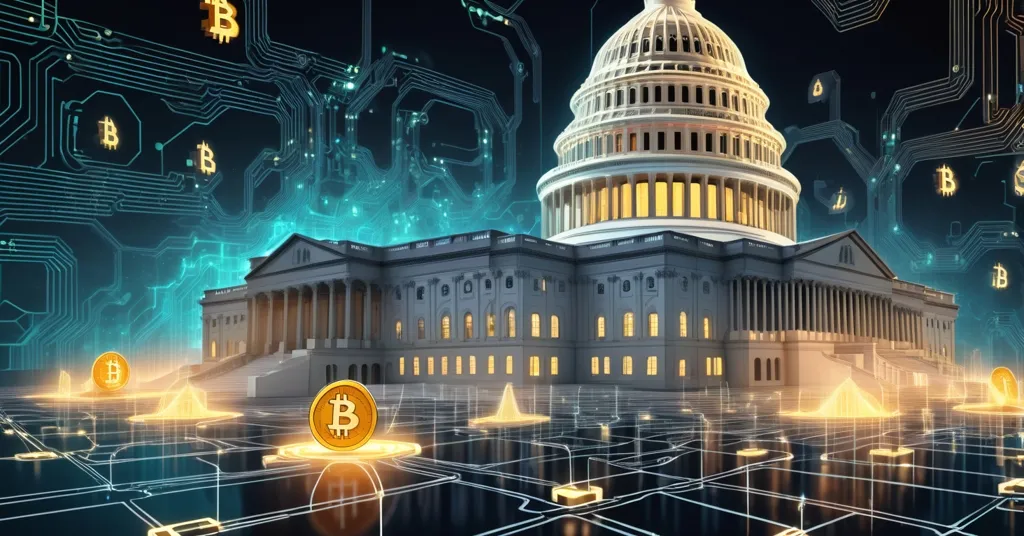US Regulators Scramble to Align with White House’s Bold Crypto Overhaul Plan

US Regulators Hustle to Match White House’s Aggressive Crypto Overhaul
Washington is in overdrive as U.S. regulators scramble to keep pace with a transformative White House plan to revolutionize digital asset governance. With Bitcoin, blockchain, and decentralized tech increasingly entangled in political and financial spheres, this could be a make-or-break moment for America’s role as a global leader in cryptocurrency innovation—or a stumble into bureaucratic quicksand.
- White House Mandate: A comprehensive 166-page report pushes for a major regulatory reset across agencies.
- SEC and CFTC Moves: Both bodies roll out urgent initiatives amid internal conflicts and industry backlash.
- Political Crypto Nexus: Trump-linked entities wield influence with massive Bitcoin holdings and donations.
White House Drops a Regulatory Bombshell
The Presidential Working Group on Digital Assets (PWG), a government team focused on cryptocurrency policy, has unleashed a 166-page manifesto titled “Strengthening American Leadership in Digital Financial Technology Report.” This isn’t just another shelf-filler; it’s a bold directive to yank U.S. crypto regulation out of the mud and position the nation as the epicenter of blockchain innovation. Key recommendations include clearer definitions for digital assets, updated custody rules, and frameworks to support tokenized markets—ideas that could either turbocharge adoption or bog down in red tape. The report’s influence, detailed in a White House fact sheet on digital assets, is already shaking up major agencies like the Securities and Exchange Commission (SEC) and the Commodity Futures Trading Commission (CFTC), setting the stage for a regulatory sprint unlike anything we’ve seen before. For Bitcoin enthusiasts and altcoin innovators alike, this is a signal: the government is finally waking up to the future of money, for better or worse.
SEC’s Project Crypto: A Shot at Redemption?
At the forefront of this push is SEC Chair Paul Atkins, who on July 31 launched “Project Crypto,” an agency-wide initiative to nail down rules on how digital assets are classified, held, and traded. Atkins is pulling no punches, framing the SEC’s role as the guiding light in President Trump’s mission to make America the “crypto capital of the world.”
“It should not be a scarlet letter to be deemed a security… investors will benefit from the opportunity to earn distributions, voting rights, and other features typical of securities,” Atkins declared, challenging the outdated stigma that securities classification kills innovation.
Central to this effort is the Howey Test, a legal yardstick from a 1946 Supreme Court case used to decide if something’s a security. In simple terms, it checks if you’re putting money into a project expecting profits based on someone else’s work. For years, this test has haunted crypto projects, with endless arguments over whether Bitcoin is a commodity and Ethereum a security. Atkins, as highlighted in his recent SEC speech on digital finance, hints that most crypto assets might not fit the security mold at all—a stance that, if locked into policy, could free countless projects from regulatory shackles. Project Crypto also dangles exemptions and modern custody solutions for tokenized assets, recognizing that old Wall Street rules don’t mesh with on-chain realities. This could be a lifeline for DeFi protocols and Bitcoin-focused firms, but only if the execution avoids the SEC’s infamous “regulation-by-enforcement” pitfalls of the past.
CFTC’s Crypto Sprint: Speeding Through a Minefield
Over at the CFTC, Acting Chair Caroline Pham isn’t wasting a second, launching a “crypto sprint” on August 1 to align with Trump’s regulatory vision and explore spot crypto contracts on futures exchanges. Her urgency is palpable.
“The CFTC is wasting no time in launching a crypto sprint to realize Trump’s regulatory goals,” Pham affirmed.
Yet, the agency is mired in chaos. Trump’s pick for permanent CFTC chair, Brian Quintenz, is under fire from industry heavyweights like Gemini co-founders Cameron and Tyler Winklevoss. They’re not subtle about their disdain, as covered in this report on the Winklevoss opposition to Quintenz.
“Quintenz is the wrong person for this nomination… his policy is not in line with the stated goals and policy of President Trump and the Trump administration,” Tyler Winklevoss stated bluntly.
Their beef? Quintenz’s views on holding DeFi developers liable for their code, his support for central bank digital currencies (CBDCs—government-backed digital money that many crypto purists despise), and potential conflicts of interest tied to his role on the board of Kalshi, a prediction market platform for betting on real-world events. With access to confidential CFTC data, critics worry about ethical breaches. This nomination drama could grind the CFTC’s progress to a halt at a critical moment, leaving futures markets for Bitcoin and altcoins in limbo. It’s a mess, and frankly, it’s more gripping than a reality show cliffhanger.
Senate Feedback: Decentralization Under Siege?
Meanwhile, the Senate Banking Committee is casting a wide net for input on draft market structure legislation, and the crypto community is firing back. Decentralized finance (DeFi) advocates and venture capital giants like Andreessen Horowitz (a16z) are demanding that decentralized systems be treated as neutral infrastructure, not saddled with the same suffocating rules as traditional brokers. They’re pushing for a control-based regulatory lens—focusing on who actually controls a system—over an efforts-based one that could unfairly target developers for code they can’t fully govern. This clash cuts to the heart of a nagging question: how do you oversee a borderless, permissionless tech like blockchain without gutting its essence? DeFi, for the uninitiated, refers to financial systems built on blockchain that cut out middlemen—think lending or trading without banks. If the Senate gets this wrong, it could choke innovation and drive projects offshore, a bitter pill for anyone rooting for decentralization.
Political Power Plays: Is Crypto a Pawn in Washington?
Now, let’s address the glaring overlap of politics and crypto, where Trump-linked entities are making waves that can’t be ignored. Trump Media & Technology Group (TMTG) posted a pitiful Q2 revenue of $883,300 and a $20 million net loss, yet somehow amassed a $2 billion Bitcoin stash, ranking it among the top public companies holding BTC. They’re also teasing a utility token, with custody managed by Crypto.com. Then there’s World Liberty Financial (WLF), a Trump-controlled DeFi platform, which poured $10 million into Falcon Finance, a murky offshoot of DWF Labs, to prop up its stablecoin USD1 as collateral. More on these recent developments with TMTG and WLF reveal the intricate ties in this space. Stablecoins, for newcomers, are cryptocurrencies tied to assets like the U.S. dollar for price stability—less rollercoaster, more steady ride compared to Bitcoin. But WLF’s dealings with questionable market-makers spark concerns about transparency and systemic risk in DeFi.
Even more striking is MAGA Inc, a Trump-linked political action committee, hauling in over $40 million in crypto donations this year. That includes $10 million from Crypto.com, $5 million from Blockchain.com, and chunks from a16z founders and Gemini. This isn’t chump change; it’s a neon sign that digital assets are now a political weapon, capable of shaping policy through raw financial clout. While this might fast-track pro-crypto laws, it stinks of potential regulatory capture—where deep pockets twist rules to their advantage. As Bitcoin maximalists, we’re wary: this politicization could erode the very freedom and decentralization crypto stands for. It’s a dangerous game, and we’re not here to sugarcoat the risks.
Global Stakes: America Can’t Afford to Lag
Zooming out, this regulatory hustle isn’t just a domestic squabble—it’s a global showdown. As SEC Chair Atkins warned, “the world is not waiting” for the U.S. to sort itself out. The European Union is charging ahead with its Markets in Crypto-Assets (MiCA) framework, set to roll out comprehensive rules by 2024, while Singapore is carving out a reputation as a crypto-friendly hub with clear guidelines already in play. If the U.S. drags its feet, it risks losing blockchain talent and capital to these jurisdictions, a concern echoed in discussions about Bitcoin’s regulatory impact in the United States. Historically, the SEC has adapted to tech upheavals, from the 1960s Paperwork Crisis—when manual stock trades nearly collapsed under volume—to the 1990s embrace of electronic trading. There’s a track record of getting it right, eventually. But with Bitcoin and decentralized tech redefining money and power itself, the margin for error feels razor-thin. Flub this, and America might not just miss out on innovation—it could forfeit the future.
Playing Devil’s Advocate: Regulation or Control?
Let’s flip the script and ask some hard questions. Is this regulatory frenzy truly about clarity, or a sneaky bid to tame a technology that threatens centralized authority? The heavy political fingerprints—Trump entities, massive donations—suggest motives beyond mere “leadership.” Clarity on asset classification via the Howey Test sounds promising, but overzealous rules could crush smaller DeFi projects that can’t shoulder compliance costs. Picture a scrappy lending protocol, built by a solo coder, forced to shut down over a $100,000 legal bill. That’s not accelerationism; it’s strangulation. Bitcoin maximalists might salivate at a U.S.-dominated crypto hub, but what about blockchain’s borderless soul? We champion effective accelerationism (e/acc) and tearing down the status quo, but not if it swaps old gatekeepers for shiny new ones. And let’s not ignore the scammers circling like vultures—fake “Trump tokens” and phishing scams are already exploiting this news, a trend noted in community discussions on Reddit about SEC updates. We’ve got zero tolerance for that garbage, so stay sharp.
What This Means for Crypto Investors
For those holding Bitcoin, exploring altcoins, or dipping into DeFi, these developments aren’t just headlines—they’re signals. Keep an eye on SEC announcements around Project Crypto; exemptions could open new investment avenues in tokenized assets. Monitor the CFTC’s moves on futures contracts, especially if Quintenz’s nomination resolves, as it might impact Bitcoin trading options, with further insights available through coverage of Quintenz’s nomination controversy. Diversify if you’re worried about regulatory whiplash—overreach could tank certain tokens overnight. And above all, don’t fall for hype or shady schemes tied to political crypto plays. We’re not here to peddle moonshot nonsense; we’re about real, responsible adoption.
Key Takeaways and Burning Questions
- Why Is the White House Pushing Crypto Regulation Now?
A 166-page report from the Presidential Working Group aims to make the U.S. a global blockchain leader by overhauling outdated policies on digital assets. - What’s the SEC Doing with Project Crypto?
Under Chair Paul Atkins, the SEC is fast-tracking rules on asset classification, custody, and trading to support innovation and align with Trump’s vision of America as the crypto capital. - Why Is Brian Quintenz’s CFTC Nomination So Divisive?
His stances on DeFi liability, CBDC support, and ties to prediction market Kalshi have sparked backlash from industry leaders like the Winklevoss twins, risking delays in CFTC policy. - How Does Political Influence Impact Crypto’s Future?
Trump-linked entities like TMTG and WLF, plus $40 million in crypto donations to MAGA Inc, blend politics with finance, raising fears of regulatory favoritism over true decentralization. - Could U.S. Regulation Stifle Blockchain Innovation?
While clarity is vital, heavy-handed rules might kill small DeFi projects or push talent abroad, clashing with crypto’s borderless ethos and slowing effective acceleration. - What’s the Global Risk if America Delays?
With the EU and Singapore advancing crypto frameworks like MiCA, U.S. hesitation could cede blockchain leadership, costing talent and capital in the race for digital finance dominance.
We’re unabashedly rooting for Bitcoin and decentralized tech to dismantle the creaky old financial system, empowering individuals with privacy and freedom. This regulatory pivot, spurred by efforts such as those outlined in U.S. regulators’ race to implement a crypto overhaul, offers a rare shot to set a global benchmark that could skyrocket adoption—think Bitcoin treasuries everywhere, DeFi mainstreamed, and tokenized assets as commonplace as stocks. But the pitfalls are glaring: overreach, political meddling, and rushed policies could derail the dream. We’ve got no time for scammers or baseless price predictions, and we’ll call out nonsense without hesitation. This isn’t about hype; it’s about forging a future where crypto keeps its rebellious heart. The clock is ticking, and the stakes couldn’t be higher.



